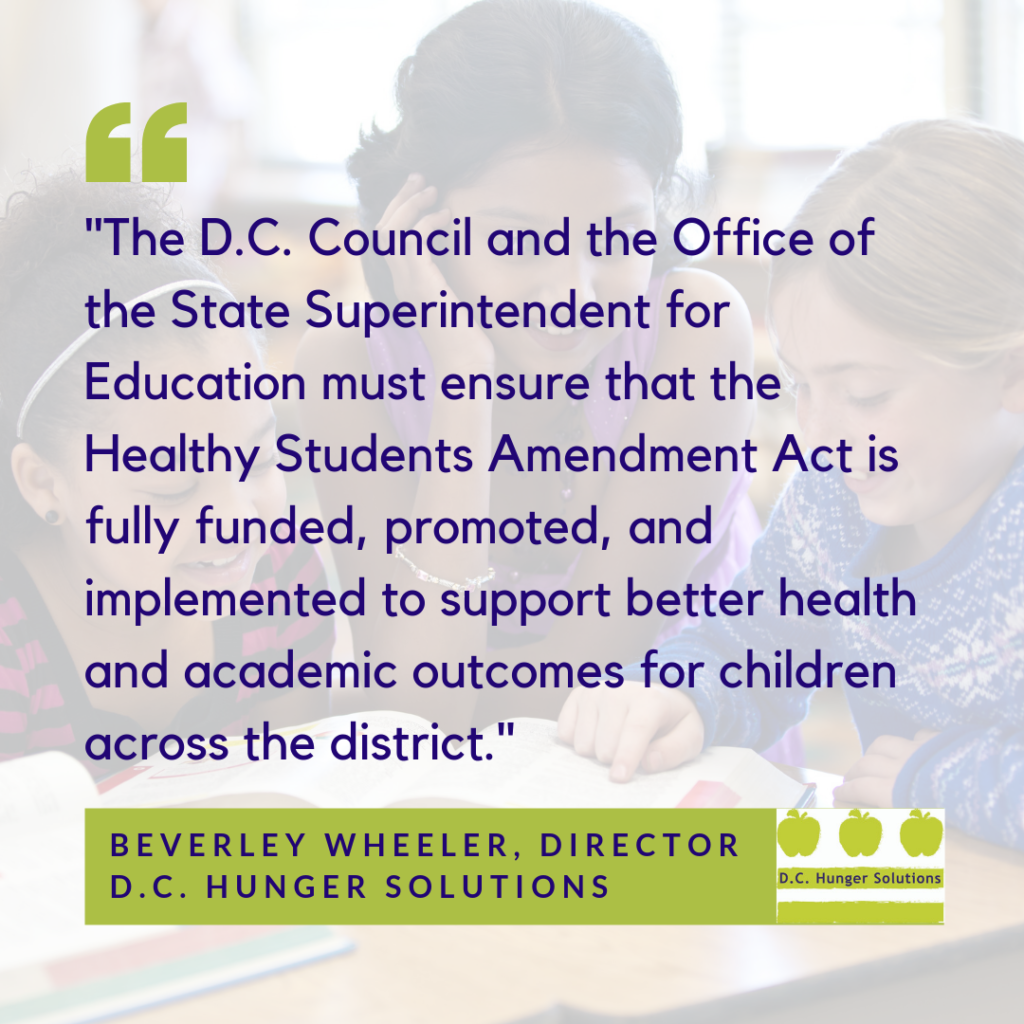Why D.C. Needs to Fund the Healthy Students Amendment Act – Q&A with Beverley Wheeler
May 1, 2019

Beverley Wheeler, Director of D.C. Hunger Solutions
On any given day during the 2017–2018 school year, more than 30,000 low-income students across the District ate school breakfast, according to D.C. Hunger Solution’s recently released D.C. School Breakfast Scorecard. However, school breakfast participation has decreased over the past four years, and too many students are missing out on the important benefits of a nutritious morning meal.
Historically, the D.C. Council has made significant investments in school breakfast. The Healthy Schools Act of 2010 provided school breakfast at no cost to all students in public schools and public charter schools, and required high-poverty schools to adopt breakfast after the bell service models to make breakfast accessible after the start of the school day. Despite early success, schools are struggling to implement school breakfast best practices, and breakfast participation is now declining. In response, the Council passed the Healthy Students Amendment Act of 2018 (HSAA).
This legislation strengthens the Healthy Schools Act by:
- maintaining the mandate for breakfast after the bell in all schools where at least 40 percent of the student body is eligible for free and reduced-price school meals;
- creating an annual subsidy from local funds to incentivize using breakfast after the bell and to reduce costs associated with its implementation;
- enhancing nutrition guidelines through additional sodium limits, restrictions on flavored milk, and whole-grain requirements beyond those in the federal rules; and
- increasing meal reimbursements for meals that meet the higher nutrition standards.
 However, funding for the Healthy Students Amendment Act was not included in Mayor Muriel Bowser’s proposed FY 2020 budget. Without funding, the Act will not be implemented.
However, funding for the Healthy Students Amendment Act was not included in Mayor Muriel Bowser’s proposed FY 2020 budget. Without funding, the Act will not be implemented.
We sat down with D.C. Hunger Solution’s Director, Beverley Wheeler, Ed.D., to talk about the importance of school breakfast and the need to fund the Healthy Students Amendment Act.
In the D.C. School Breakfast Scorecard, D.C. Hunger Solutions makes the recommendation to fully fund the HSAA in order to increase access to school breakfast for low-income students. How will the HSAA help to increase school breakfast participation?
The most effective way to increase access to school breakfast is by using alternative school breakfast service models, like breakfast in the classroom, to better make breakfast a part of the school day. The HSAA strengthens the 2010 mandate found in the Healthy Schools Act that requires all high-poverty D.C. public schools — both traditional and charter — to implement alternative service models.
However, implementing alternative service models can be an extra expense for schools, as they may require additional staffing and equipment (e.g., coolers and trash cans). The HSAA addresses this issue by creating an annual $2 per student subsidy for schools implementing alternative service models, and by increasing reimbursements for meals that meet enhanced nutrition standards. By incentivizing best practices, more schools will be in compliance with the Healthy Schools Act, and more low-income children will have access to school breakfast.
Why should access to school breakfast be a priority for D.C. schools and the D.C. Council?
D.C. schools and the D.C. Council have already invested a lot in school nutrition and low-income students, but more needs to be done. School breakfast improves academic achievement, reduces trips to the school nurse, lowers frequency of delinquent behavior, and even decreases household food insecurity. We know the benefits of school breakfast, and we know early investment in the well-being of our students is the right thing to do.
Who has the most to gain from increasing access to school breakfast?
Students have the most to gain from school breakfast. School breakfast sets students up for not only a productive, healthy day, but also a productive, healthy life. That is what we want for our students and the next generation of D.C. residents.
In the HSAA, the breakfast in the classroom subsidy for schools is changed from a one-time $7 per pupil subsidy (provided in 2010) to an annual $2 per pupil subsidy. Why do you think this change is necessary?
A one-time subsidy almost ten years ago is inadequate for what we are trying to achieve. Breakfast in the classroom requires a lot of equipment and recurring costs, which a one-time subsidy does not account for. A one-time subsidy also does not consider yearly increases in enrollment. If we are serious about increasing access to breakfast for all students — especially low-income students — we need to make a long-standing investment in school breakfast. We don’t want to set schools up for failure.
How can D.C. residents be involved in making sure the HSAA is funded?
Residents can and should call their councilmember to demand full funding of the Healthy Students Amendment Act. We are disappointed the Mayor did not put any funding for the HSAA in her proposed FY 2020 budget, but the D.C. Council now has the opportunity to fund the Act in the FY 2020 funding bill. Council passed this legislation in 2018, and it should not become an unfunded mandate. The health, wellness, and academic achievement of our young people is on the line.
Learn more about D.C. school breakfast participation trends.
